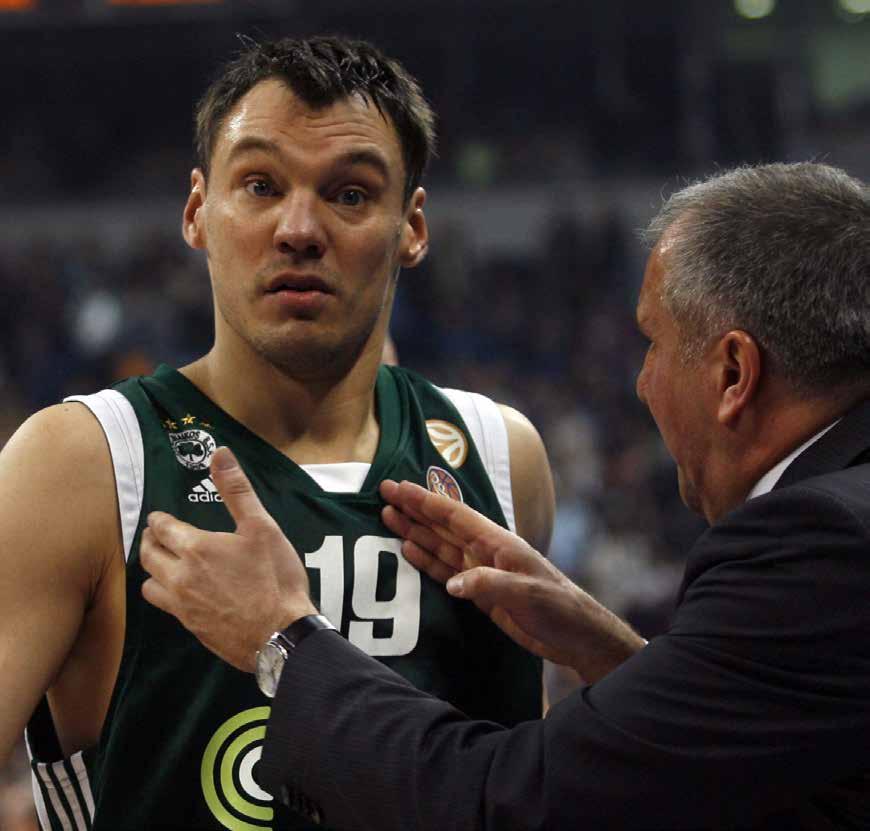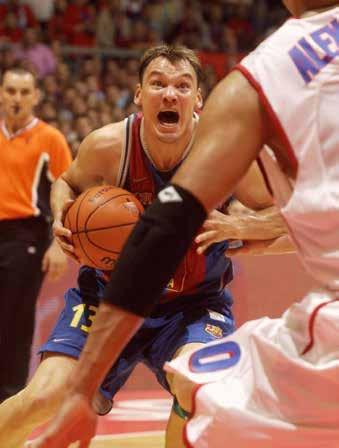
7 minute read
SARUNAS JASIKEVICIUS
Sarunas
Jasikevicius
Advertisement
Mr. Basketball A famous Brazilian footballer, Waldyr Pereira, also known as Didi, who was a world champion in 1958 and 1962, had “Mr. Football” as his nickname. I am going to paraphrase that because for Sarunas Jasikevicius, I cannot find anything better. Mr. Basketball. Those two words ex plain what he was – and is – all about: his greatness, his huge talent, his character, his basketball IQ, his shot, his genius assists and the joy he spread to teammates, fans and sometimes even opponents. Sagadin, the discoverer The story of Sarunas Jasikevicius could start in many ways. But I think that the first graphs belong to the man who discovered Saras for European basketball: Zmago Sagadin. The Slovenian coach, a former boss of Union Olimpija and the Slovenian national team, told me about his decision to bring Jasikevicius to his Olimpija team.
“My sources in the United States, where Sarunas played, told me about his talent and sent me a few vid eos, and it is true that I liked him on the spot. I also had some reports from Lithuania but decided to see him live in France at EuroBasket 1999. I spent 10 days fol lowing Sarunas, but he didn’t play much, not enough to convince me. I had to trust the videos and my instinct. I decided to sign him, and I can safely say it was one of the best decisions of my life. Sarunas was a brilliant player. He had it all: talent, technique, character, leader ship. He was also a hard worker. For me, he’s among the top 10 players ever in European basketball.”
Sagadin highlights the final game against Olympiacos Piraeus of their 1999-2000 EuroLeague playoff series, which was tied at 1-1. The decisive game was played in Ljubljana, where Olimpija won 85-67 as Jasikevicius netted 30 points and made 7 of 7 three-pointers. “He played a flawless game,” Sagadin said. Olimpija had a good team, with Marko Milic, Sani Becirovic, Primoz Brezec, Slavko Kotnik and Jure Zdovc. In the quarterfinals, FC Barcelona ousted Olimpija 2-1 but struggled to do so and advance to the Thessalon iki Final Four. However, Coach Aito Garcia Reneses laid his eyes on Jasikevicius and asked his club to sign the guard as a top priority.
Signing for Barcelona in the summer of 2000 was a key step in the career of Jasikevicius. He was already 24 years old, the perfect moment to clear the doubts about whether he was just another strong Lithuanian talent or a top-class player who could play on great teams to achieve great things.
I can say that Jasikevicius is one of the players that I have seen the most in person. I saw him at EuroBaskets in 1997, 1999, 2001, 2003, 2007 and 2011. Also, at the Sydney Olympics in 2000, Athens in 2004, and London in 2012. I saw him in all of his Final Fours and, especially, in the four seasons that Saras spent in Barcelona. I can also say that it has been a privilege to enjoy his game. Sports roots Rita Jasikeviciene, the mother of Sarunas Jasikevicius, was an important handball player in her day and a member of the USSR national team that won medals at the world championships in the early 1970s. But she would skip the 1976 Olympic Games in order to give birth to Sarunas, who arrived on March 5 of that year. Igor Turcin, the team’s head coach, was mad at Rita
101 greats of european basketball Sarunas Jasikevicius
because her absence disrupted his plans for the first Olympics with women’s handball. He never called Rita to the team again.
Rita gave preference to his motherhood over her sports career. Many years later, she told her son that he “owed her an Olympics.” In Sydney 2000, Saras bought two tickets for his parents. His father Linas was a table tennis player. Sarunas for sure didn’t lack for sports genes. His parents say that he was a lively kid, always on the move. His worst punishment was having to be still and sitting down. When he started playing basketball, his coach Feliksas Mitkevicius quickly saw his talent, but Sarunas wasn’t sure his future was in basketball and at 12 years old, he decided to switch to tennis.
Mitkevicius went to the Jasikevicius’ household to explain that Saras had a huge talent and a bright fu ture in basketball. The three of them convinced Saras to stay in basketball, even though he has admitted that he didn’t see himself in basketball until he was 14 years old. The first calls to the cadet Lithuanian national team sparked his ambition and his competitiveness. Little by little he realized that he played well, that it was easy for him and that he had fun. This last one, his joy for the game, would become his career trademark. In 1994, when he won the U18 European Championship with Lithuania in Tel Aviv (73-71 against Croatia and two years later 85-81 against Spain in the U22 World Championship), his future was decided.
At 17 years old, Jasikevicius moved to the United States to study at Solanco High School in Quarryville, Pennsylvania. The next logical step was college. He chose the University of Maryland, but when four years later the NBA showed no interest, he moved back home and signed his first pro contract with Lietuvos Rytas for $50,000. He went from Vilnius to Ljubljana and then from Slovenia to Barcelona, where he started rewriting basketball history as the point guard for the club’s first, long-awaited EuroLeague title. He would continue lat er in Tel Aviv, Istanbul and Athens and then, to finish his career, in his native Kaunas. After winning his first EuroLeague with Barcelona in 2003 at Palau Sant Jor di against Benetton Treviso in the final, he signed for Maccabi and they won back-to-back European crowns. Since the days of the great Jugoplastika, there had been no players with three consecutive titles. He entered a select list with Toni Kukoc, Velimir Perasovic, Zoran Sre tenovic, Luka Pavicevic and Zan Tabak. His fourth title arrived in 2008-09 with Panathinaikos. Nobody except him has ever won the EuroLeague with three different teams.
Exhibition in Sweden I was a direct witness to his four continental club crowns, but I think that the one that brought him even more happiness was a fifth one, won with Lithuania at EuroBasket 2003 in Sweden, where his national team lifted the trophy for the first time in 64 years. In the big final, Lithuania defeated Spain, 93-84. Jasikevicius ended up with 14.0 points and 8.2 assists per game. In the final he scored 10 points but dished 9 assists. It was his great moment. In May that year he had won his first EuroLeague trophy with Barcelona, and months later his first EuroBasket. Lithuania had a great team: Ramunas Siskauskas, Saulius Stombergas, Arvydas Macijauskas, Eurelijus Zukauskas, Mindaugas Zukaus kas, Ksistof Lavrinovic, Darius Songaila and Donatas Slanina. They averaged over 90 points in six games at the tournament. It was an offensive display of happy basketball, with imagination and improvisation that
could only come with huge talent. The tournament MVP? Of course, it was Jasikevicius.
One year later at the 2004 Olympics in Athens, I saw the victory of Lithuania over the United States, 94-90, one of the best in his career. In 32 minutes, he scored 32 points with 7 of 12 threes and 4 assists. It was his par ticular revenge for the semifinal defeat in 2000 Sydney Olympics (83-85), in which the Lithuanians missed the last shot. The bronze medal was a good consolation.
It’s not easy to count all the titles he has won. If I am not mistaken, he was a champ nine times in five differ

ent national leagues: Greece (3), Spain (2), Israel (2), Turkey (1) and Lithuania (1). He won 10 national cups in five countries: Olimpija (1), Barcelona (3), Panathinaikos (3), Maccabi (2) and Fenerbahce (1). His individual acco lades ask for a lot of space. One of the biggest accolades off the court has been the naming of one of the meeting rooms at Euroleague Basketball headquarters in Barcelona after him. This is how the stars that leave their mark in the competition should be respected.
In 2015, Jasikevicius was honored as a Euroleague Basketball Legend before the Top 16 game between Zalgiris Kaunas and Real Madrid. Before a long, standing ovation from his hometown fans, a video was shown at Zalgirio Arena in which some of his best moments ap peared, along with statements from former teammates like Juan Carlos Navarro, or his coach in Panathinaikos, Zeljko Obradovic.
I am happy to see him on the Zalgiris bench now. It was the club of his dreams, in his native city. With bas ketball in his blood, it was only a matter of time before we saw him become a head coach, too.
If somebody must teach how basketball is played, then it is Mr. Basketball, Sarunas Jasikevicius.
101 greats of european basketball Sarunas Jasikevicius










